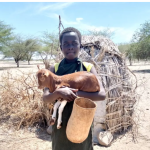On the 21st of July 2022, PACEMaker International hosted a PAL Network team at Komarock Primary School for a level-based teaching literacy session adapted from the Teaching at the Right Level (TaRL) approach. The team consisted of four member organisations – Zizi Afrique Foundation Kenya, Youth Impact Botswana, GLOT Colombia and TEP Center Nigeria. Komarock Primary school is located in Embakasi Sub County in Nairobi County and admits children from informal settlements.
The team first paid a courtesy visit to the headteacher, who took the time to share the positives brought about by PACEMaker International’s programme in the school. The programme utilises volunteers, known as PACE fellows, to conduct support teachers. The fellows are mostly tertiary-level students who support grades 1,5,6,7 and 8. The headteacher highlighted that since the start of the programme, children have been able to catch up on reading and maths skills, their grades have improved tremendously, and they are more active in class.
The teachers and learners say the issues they have experienced recently are due to the COVID-19 pandemic. These hurdles include children not being able to report back to school, some being unable to read or not remembering what they had learnt, which meant teaching them afresh rather than picking up from where they left off. While private schools transitioned to online learning, being a public school disadvantaged learners since they could not learn online, leading to a slump in the learning process.
During the visit, a team of five fellows led a literacy session. There were 16 learners present, who were then split into three groups. The Session, conducted during the hour-long lunch break, entailed Oral Story Reading, Drawing and Coloring, use of SATPIN and Picture Card Reading. We learned that the fellows draw their plans at the beginning of the week to determine what to do and how to conduct the sessions. Their plans include identifying the themes of focus for each session.
The fellows shared insights into what it takes to support learners as youth. They said you need patience and commitment to improve the children’s education, the desire to be there for the children, passion and inspiration, excitement and motivation, consistency and creativity as well as a conducive environment (which involves mobilising the community and its inclusion in its children’s education). The fellows further maintained you need to have a personal drive, understand the crisis (mostly felt by the relatives), value the child and have the energy to do it in their youthful lives.
The fellows also had a chance to share their views on the differences between the level-based teaching sessions and the regular classroom sessions. As one mentioned, “The sessions are jovial and fun because the fellows are friendly, youthful and understanding. They are conducted in groups rather than the standard classroom situation where the sessions are rigid and in large groups, so the children find it easier to engage.”
In the spirit of learning and sharing, the Zizi Afrique Foundation team also relayed its experiences on implementing the Accelerated Learning Program (ALP). The ALP sessions have a defined structure, with a series of activities to be followed. The programme begins with a whole class session, after which learners are split into groups for group-level activities, concluding with a whole class activity. One difference noted was that the story reading was done by the PACE fellows, while the accelerated learning programme context is more learner-led. ALP sessions have learners following the text being read, although they can also practise on their own. Thus, PACE clubs are teacher-led, while Zizi sessions are learner-led.
The key takeaways from the team were that they would want to interact more with the youth when implementing the initiative in their various organisations to see the difference it would bring. Children interact better with the youth because they feel more comfortable with them. They find being taught by the fellows more interesting and interactive. This makes the children less shy and helps them open up to overcome their learning difficulties.









